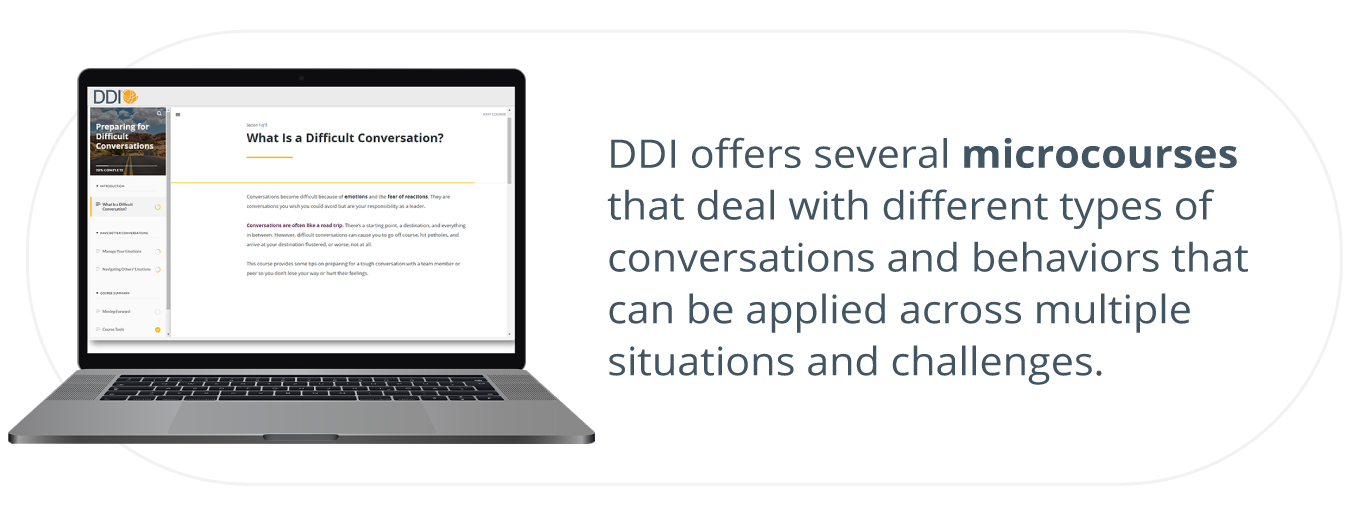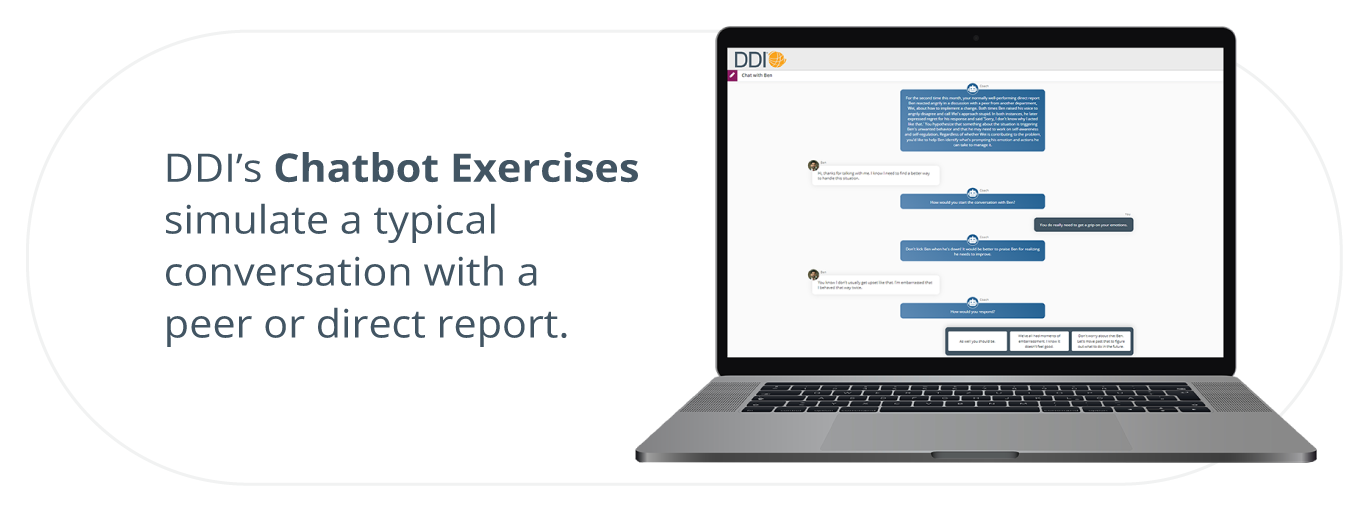Help Leaders in a Tough Moment
Sleepless nights. Anxious commutes. Panicked Googling to quickly find resources.
Every leader experiences tough moments that they dread, like having a difficult performance conversation with a colleague you’re close with or driving an unpopular change. As the moment approaches, they’re seeking out just-in-time support to boost their confidence.
Often, leaders turn to a quick internet search, hoping to quickly find something inspiring. But of course, there’s no telling the quality of what they’ll find online, or if it fits with your leadership culture. That’s why it’s critical to ensure they have access to on-demand learning tools and resources to give them support in the moment.
In this section, we’ll show an example of how you can give just-in-time support to leaders when they have a challenging conversation coming up.
Tackling Challenging Conversations at the Time of Need
Ideally, you are already helping leaders develop the right foundational leadership skills as soon as they become a leader. But as they approach a challenge in the moment, they can leverage on-demand content to refresh and reinforce their skills.
We’ll explore some ways you can do that, using DDI content as an example. We’ll cover formats including microcourses, tools, and short content.

Microcourses for Just-in-Time Support for Leaders
Microcourses are one of the best ways to help leaders quickly brush up on their skills. These short online courses can be completed in less than 10 minutes and help leaders focus on a particular aspect of a skill.
Here are examples of topics that might be addressed in the microcourse format to help leaders have challenging conversations. Note that each can help leaders address a specific concern they may be dealing with in the moment:
- Addressing Poor Work Habits This practical course shares problem-solving tips to discuss and resolve poor work habits, such as punctuality, meeting preparation, etc. Expert coaches provide advice on how to make positive habits stick.
- Giving Feedback for Improvement This course focuses on giving feedback that drives meaningful change. It shares common mistakes and offers a DDI framework called the STAR/AR model that leaders can use when delivering feedback for improvement.
- Handling Emotion and Upset In this course, leaders learn about three common approaches that make negative feelings worse. They also learn how to use empathy to help an upset employee return to a calm, productive state.
- Preparing for Difficult Conversations This course helps leaders to prepare for a difficult conversation. It shares common pitfalls and helps leaders to understand their personal approach and how they can adapt it to be more effective.
- Resolving a Conflict You’re Involved In This course uses DDI’s Interaction Essentials SM to uncover the causes of conflict, establish a more positive working relationship, and develop solutions that all parties can support.

On-Demand Practice Tools
In addition to getting tips and information from microcourses, leaders may want the chance to quickly practice their skills. That’s where you can use elements like simulations, chatbots, and digital practice tools. These offer a great opportunity to simulate real-world challenges to boost a leader’s confidence and skills before doing the real thing.
For example, we have used chatbots to simulate a typical conversation with a peer or direct report. With this tool, leaders get instant feedback from a virtual coach about how they respond to the situation, helping them to think about the impact of their responses.
Another example of an on-demand resource is a self-insight tool. We often use these to help leaders understand their personal tendencies and behaviors that may influence their approach to a difficult conversation. After using this tool, leaders can go into conversations knowing where they may struggle and focus on strategies to override their natural tendencies.

Application Tools and Resources
One of the most important things leaders can use in the moment are application tools. At DDI, we have found that conversation planners are incredibly powerful in these situations. They can help leaders plan out what they’re going to do and say, in line with what they’ve learned in courses. That way, they can think through a conversation ahead of time and plan how they will apply their leadership skills.
For example, DDI’s Thinking Through Conversations worksheet from the Preparing for Difficult Conversations microcourse offers a series of questions to help leaders prepare for a difficult conversation:
- Do I have a hidden agenda for this conversation?
- Is this a one-time, prolonged, or recurring issue?
- Do I tend to look at this person or situation with an unconscious bias?
- What solutions and support can I offer?
- What do I want to see more of (collaboration, clear communication, improved processes, etc.)?
These resources are incredibly powerful for helping a leader feel prepared – and less anxious – about a tough conversation.
Leadership Happens in the Moment
When we talk about supporting leaders in the moment, we’re not suggesting that they try to learn major new skills in a few minutes. Rather, the goal is to help them refresh their knowledge or dive a little deeper into the exact challenge they are facing. And most of all, you want to give them support to practice and apply skills in the moment.
By giving just-in-time support to leaders, they can apply what they’ve learned in courses they took six weeks or six years ago. And that’s how leadership skills truly come to life.
